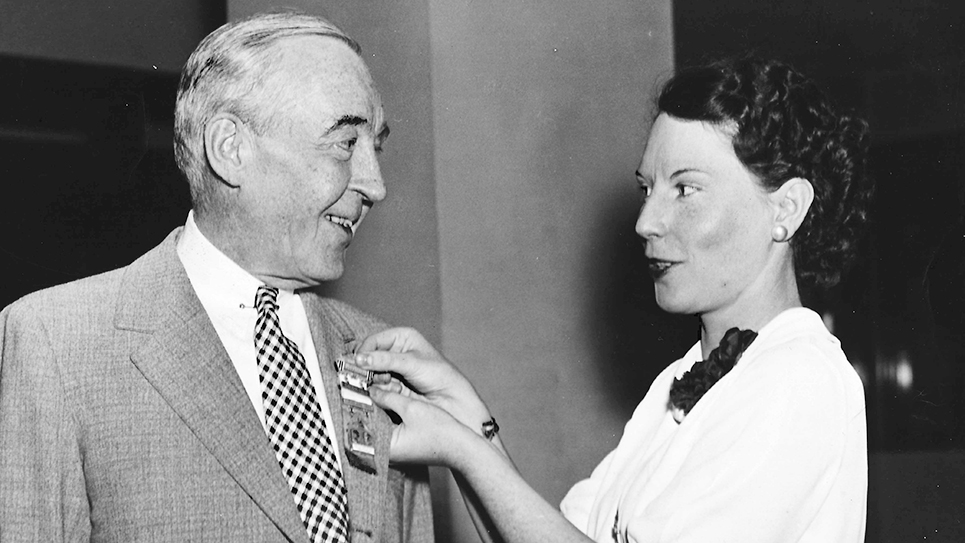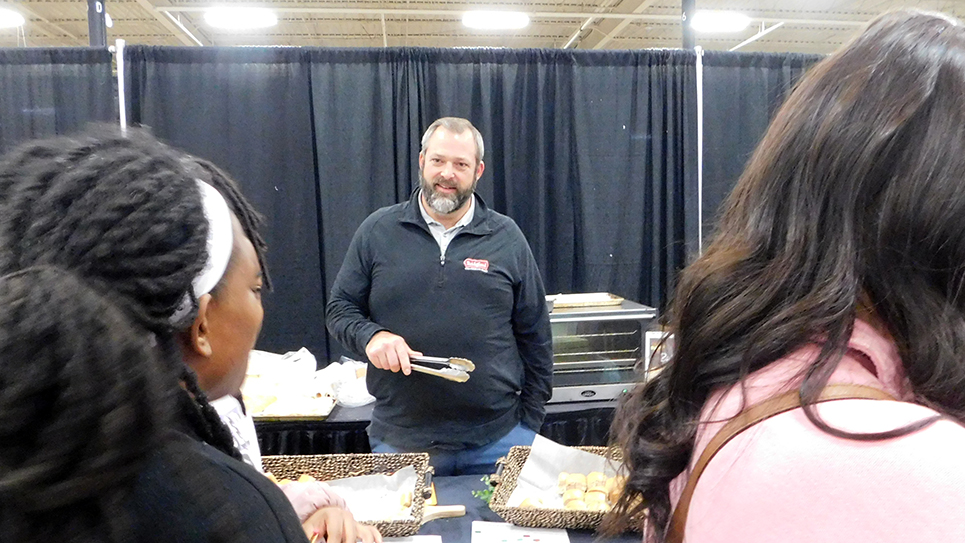By Ray Hill
Carroll Reece had spent a decade in Congress serving Tennessee’s First Congressional District when he had been upset by Oscar Byrd Lovette, the former district attorney general from Greene County in the 1930 general election. Reece had faced a tough primary challenge that year from attorney Sam W. Price, yet it seemed virtually impossible the congressman could lose the general election to the Independent candidacy of O. B. Lovette. Lovette had announced and organized a campaign which was waged in ten days. Lovette hammered home his support for water power projects run by the government for the benefit of the people rather than the private interests. Congressman Carroll Reece was on the other side of the issue, supporting the approach favored by President Herbert Hoover, who was against government ownership of the water powered project proposed at Muscle Shoals, the forerunner of the Tennessee Valley Authority. Reece had also upset many constituents by his failure to get the Cove Creek Dam built. Public power was a potent issue in Tennessee politics and the state’s senior U. S. senator, Kenneth D. McKellar, was an outspoken advocate for public power and an equally fierce foe of private power interests. The issue was enough to take Carroll Reece under in the 1930 general election.
Reece was determined to regain his seat in Congress and ran again in 1932, challenging O. B. Lovette who ran in the Republican primary that year. Forever labeled as a party bolter, an issue which Carroll Reece repeated in every city, town and hamlet inside the First District, O. B. Lovette tried hard to burnish his GOP credentials throughout his two-year term of office in anticipation of running a primary campaign. Carroll Reece was personally wealthy through his marriage to Louise Despard Goff, daughter of the very rich Guy Despard Goff of West Virginia. There was also every indication Carroll Reece was a shrewd businessman who increased his family holdings throughout his life. During the two years he was out of office, Reece began a relentless campaign to win back his congressional seat from O. B. Lovette. Reece was aided in his pursuit of his seat by the administration of President Herbert Hoover who openly and continuously funneled patronage and projects through the former congressman rather than the incumbent, O. B. Lovette. It had to be a humiliating and infuriating experience for Congressman Lovette to see his nominees for federal jobs and offices inside his own district ignored in favor of those recommended by his predecessor.
Carroll Reece had the advantage of his wealth, experience, and the support of the Hoover administration as well as his own deep roots inside the First Congressional District. After having served the district for a decade, he had done many favors for countless families throughout the district and retained the loyalty of most of the GOP apparatus in the First District.
Although his campaign managers predicted a sweeping victory in every county comprising the First District, Carroll Reece only narrowly managed to defeat O. B. Lovette for the GOP nomination for Congress. Almost immediately following the election, East Tennessee newspapers began reporting alleged irregularities. The Knoxville News Sentinel carried a story that while election returns from Claiborne County gave Carroll Reece a majority over Congressman O. B. Lovette, there was already a protest from the Lovette campaign. Ben England, a Lovette supporter said, “We can produce affidavits that persons from 13 up were allowed to vote. No poll tax receipts were required at many precincts. A Reece official mailed out notices to election officials telling them to disregard poll tax receipts.” England added emphatically, “The Claiborne County returns will have to be thrown out.”
By August 7, the Nashville Banner carried a story stating a very happy Carroll Reece was in Knoxville, while Congressman O. B. Lovette was going to contest the election returns from Claiborne County. Reportedly, Claiborne County had given Reece a majority of 2,003 votes, which was enough to give the former congressman a majority of 1,737 votes districtwide. When told Lovette intended to challenge the results in Claiborne County, Reece replied, “It won’t do him any good.”
Whether it did him any good or not, O. B. Lovette persisted. The Chattanooga Daily Times published a report on August 10 the congressman was “pushing an investigation into alleged fraudulent voting” in Claiborne county.” Reece was jubilant when he pointed out Congressman O. B. Lovette had failed to file a contest following the results of the August 4, 1932 primary election as required by law. Reece said he was grateful of “this willingness of my late opponent to bow to the will of the majority of the Republican voters of the district.” Carroll Reece cheerfully admitted had Lovette been able to demonstrate the charges made “by the less reliable supporters” of the congressman, Lovette would have surely carried his fight to the Republican State Executive Committee. Supposed election irregularities were hardly one-sided, Reece claimed. The former congressman insisted :there were countless irregularities reported to me in the counties which my late opponent carried by large majorities.” Reece issued a statement saying, “I have no criticism of those Republicans who supported my late opponent in the recent primary and, as the party nominee, entitled to their support in the coming election.” Reece said he would attempt to justify the support the Republicans of the First Congressional District had given him.
The lack of official election returns from the Tennessee Secretary of State’s office decades after the 1932 primary might be explained by the statement of T. J. Harrison, the Hancock County Superintendent of Schools. Harrison decried the 1932 GOP primary election in his home county as “the most corrupt” congressional election of his experience. The superintendent insisted he had affidavits and “other evidence” “to prove wholesale fraud on the part of Lovette workers in the election.” According to the Greeneville Sun Oscar Byrd Lovette was reported to have carried Hancock County by 82 votes in the primary. Harrison, a supporter of Carroll Reece, charged, “There were at least 500 unqualified votes cast for Lovette in the primary.” “In one district where there are 49 names on the certified poll tax list, 30 votes were cast for Reece and 152 were cast for Lovette.
“Lovette had a three to two majority on the primary board in the county,” Harrison explained. “The Lovette majority would not allow the two members who favored Reece to sit in on the meetings of the board and the Reece supporters had no say whatsoever in picking the election officers and were not even allowed to have watchers at the polls.” Harrison detailed his allegations, which were likely prodded along by the Reece campaign to show election irregularities occurred in counties carried by both candidates.
The charges about election irregularities brought a statement from Carroll Reece denying neither he nor his supporters had sent money into Claiborne County for the primary election. “Neither I nor any of my friends sent one dollar to Claiborne county, so certainly they had no slush fund,” Reece said. “Mr. Lovette charges my friends in Claiborne issued bogus poll tax receipts and used liquor. This is challenged as utterly untrue and no credible testimony can be produced to sustain it.” The former congressman noted Lovette used an example that there were more votes cast in the congressional primary for Congress than won by the GOP nominee for sheriff in Claiborne county. Reece said Washington County “where Mr. Lovette’s friends selected every judge in every precinct, refusing my friends the right to have a single representative” was an interesting case. “There were 6,101 votes cast in the Republican primary, whereas Mr. Williams, the Republican candidate for sheriff, received only 3,353.” Carroll Reece simplified it by pointing out, “In other words, in the Washington county primary, held entirely by Lovette appointees, there were 2,748 more votes cast in the primary than the nominee for sheriff received.” To this day, the down ballot vote is usually less than that cast in federal and state races.
Carroll Reece’s statement on the specific election irregularities was a pretty effective refutation of much of what Congressman O. B. Lovette had alleged. Reece was certified as the Republican nominee for Congress from the First District by the Republican State Primary Board. Reece continued campaigning throughout the district in early September. The Knoxville News Sentinel duly noted a visit by Reece, his wife Louise and “their poodle dog” to Dandridge, Tennessee.
1932 was the year of party bolters and sore losers in Tennessee. Lewis Pope had failed to beat Hill McAlister for the Democratic nomination for governor that year and promptly announced he would run in the fall as an Independent. Likewise, came the announcement most everybody in Tennessee’s First Congressional District had expected. Citing election fraud, Congressman O. B. Lovette declared his candidacy for reelection in the general election as an Independent. Both Pope and Lovette insisted they were the legitimate nominees of their respective political parties. Carroll Reece issued a statement once again denouncing O. B. Lovette’s party irregularity. Reece turned down Lovette’s invitation to debate, sniffing, “I do not propose to promote further dissension and confusion and to prostitute the hope of carrying Tennessee for the Republican ticket by engaging in any joint debates with a bolter of the party ticket.” Of course in the heavily Republican First District, Reece had no need to participate in a joint debate and realized he would be at a disadvantage were he to do so. O. B. Lovette, an attorney, could unleash a torrent of words on just about any subject at any time. To Lovette’s charge there were a “number of issues between us”, Carroll Reece retorted, “One great issue between us is whether you are going to continue to bolt the Republican ticket in the November election and violate your plighted words of honor given publicly at Chicago.” Reece dismissed Lovette’s candidacy as “begotten in the slime of party disloyalty and contrary to all the rules of fair play and political integrity.”
Carroll Reece had waited to reply to O. B. Lovette’s broadside announcing his Independent candidacy following the Tennessee Republican State Executive Committee asking the congressman to withdraw as a candidate in the interests of party harmony. Lovette snapped he was “running my own show” while Reece reminded the congressman, “Thousands of upright Republicans who voted for you in August are now satisfied…to support me as the nominee.” Carroll Reece insisted the Republican candidates in Tennessee needed a party united for the fall election and he would do nothing to injure the success of his fellow candidates. The general election would be a three-man affair with Carroll Reece running for Congress as the Republican nominee and Albert Carter Tipton, a young attorney, running as the Democratic nominee and Congressman Oscar Byrd Lovette running as an Independent.
The real contest inside Tennessee’s First Congressional District was over. While Congressman Lovette attempted to revive the issues that had brought him victory in the 1930 general election, voters seemed less inclined to support a candidate who had campaigned in the primary as the “economy” candidate. Virtually everyone in Tennessee suffered from the onset of the Great Depression and Republicans in the mountains of East Tennessee were no exception. Carroll Reece had proven his ability to deliver services to his constituents, an art perfected by Tennessee’s senior U. S. senator Kenneth McKellar. East Tennesseans wanted jobs, food for their children and themselves, and a decent life. O. B. Lovette made a good showing, winning 27,888 votes, while Albert Carter Tipton won a meager 7,950 ballots. Carroll Reece won 30,336 votes to return to Congress in one of the worst electoral defeats his Republican Party had ever suffered.
The decade of the 1920s had, politically speaking, belonged to the Republican Party. The decade of the 1930s would belong to the Democratic Party. The 1932 election was the dawn of the age of Franklin Roosevelt and the New Deal.






